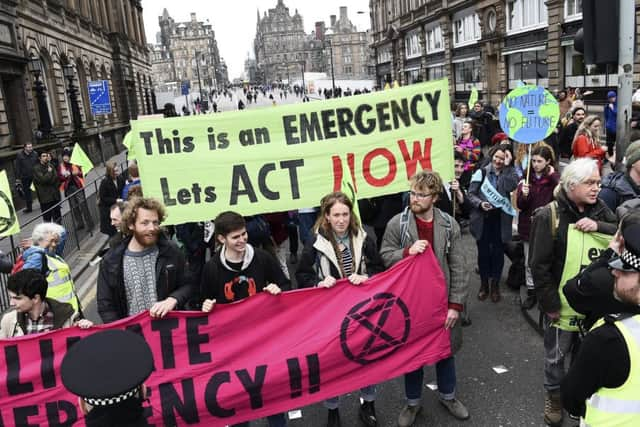Climate change rebellion is now a necessity – Joyce McMillan
Let’s just suppose, for a moment, that we take seriously the findings of the latest UN report on climate change, published in October 2018. The report argues that in order to keep global warming to level of around 1.5 degrees Celsius, carbon emissions will have to be reduced by 45 per cent by 2030 – effectively a decade from now – and close to zero by 2050, or by the time a child born this year turns 30.
Failure to achieve that will mean increasing climate breakdown and unpredictability, massive economic disruption, unthinkable loss of wildlife in the oceans and on land, and catastrophic consequences for human populations across the planet.
Advertisement
Hide AdAdvertisement
Hide AdGovernments are aware of the issue, of course; and with one or two notable exceptions – notably Donald Trump’s denialist US administration – they are signed up to the Paris Agreement on climate change. Most of them, though, are not fully achieving the Paris targets. In 2018, after some declines in previous years, global carbon emissions reached a heartbreaking all-time high; and in any case, the targets themselves are now out of date, insufficient to prevent global warming reaching at least two degrees, and thereby setting up runaway feedback mechanisms. Nor are most Western voters – cash-strapped and stressed out after a generation of crude neoliberal economic policy – in the mood to have their daily lives made any more difficult. Life is tough enough from one payday to the next, they rightly point out, without having to worry about the fate of the planet.


Suppose, though, that you are one of those who cannot push these findings away; someone like Sir David Attenborough, whose sobering documentary about climate change was broadcast last night, or Mark Carney, the governor of the Bank of England, who said last week that big companies should be planning now for an orderly transition to zero carbon. Suppose you are not an elderly establishment news presenter with the power to transform your terror at what may happen to your grandchildren into irritable rudeness against those who won’t let you forget it. Imagine, instead, that you are a 20-year-old student – or a 70-year-old grandparent – with enough understanding of science to know that this is not yet another imaginary apocalypse. What do you do, when democracy and democratically elected leaders fail you; and when they keep talking as if business as usual were possible, from North Sea oilfields to the aviation industry?
The time-honoured answer, of course, is that you get on to the streets, get yourselves to the top of the news agenda, and start trying to change the minds of your fellow voters, and through them a failing generation of politicians. In that sense, Extinction Rebellion – the group that closed Edinburgh’s North Bridge and brought parts of London to a standstill on Wednesday – have made a good start; and although disruption is always annoying, it is apparently now the only way to seize the attention of a UK mainstream media largely obsessed by Brexit, and by the rise of a nationalistic right whose entire politics often seems like a psychological blocking exercise against 21st century realities, including climate change.
The grumbling old reactionaries of the British political scene were naturally out in force on Wednesday, mumbling about how governments are already doing all they can, and how “there are better ways of making a political point”. In this case, though, neither comment is remotely true. The extinction rebels will need to be imaginative, of course, in taking their case forward; public support will not grow if they have nothing to offer but assorted transport disruptions. For those who care about the future of planet Earth, though, rebellion and creative shock tactics are now a necessity. Domestic efforts at voluntary change – faffing around avoiding disposable nappies or single-use plastics – have run out of time; and now we need big legislative change, with massive public support, in very short order. Or perhaps, we die.
